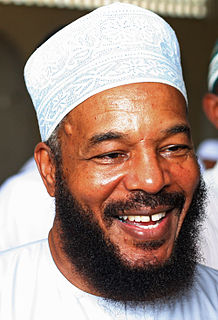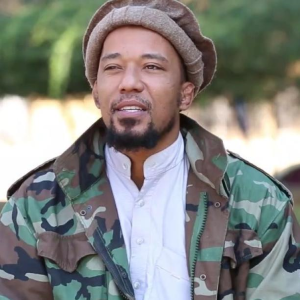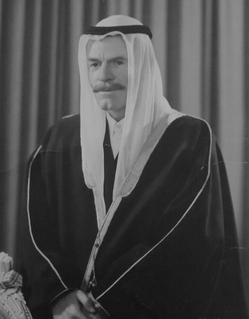
Islam's significance in Germany has largely increased after the labour migration in the 1960s and several waves of political refugees since the 1970s.

Al-Muhajiroun is a proscribed militant network based in Saudi Arabia. The founder of the group was Omar Bakri Muhammad, a Syrian who previously belonged to Hizb ut-Tahrir; he was not permitted to re-enter Britain after 2005. According to The Times, the organisation has been linked to international terrorism, homophobia, and antisemitism. The group became notorious for its September 2002 conference "The Magnificent 19", praising the September 11, 2001 attacks. The network mutates periodically so as to evade the law; it operates under many different aliases.

Abu Ameenah Bilal Philips, is a Canadian Islamic teacher, speaker, author, founder and chancellor of the International Open University, who lives in Qatar.
Jihadism is a neologism which is used in reference to "militant Islamic movements that are perceived as existentially threatening to the West" and "rooted in political Islam." Appearing earlier in the Pakistani and Indian media, Western journalists adopted the term in the aftermath of the September 11 attacks of 2001. Since then, it has been applied to various insurgent Islamic extremist, militant Islamist, and terrorist individuals and organizations whose ideologies are based on the Islamic notion of jihad. It has also been applied to various Islamic empires in history, such as the Arab Umayyad Caliphate and the Ottoman empire, who extensively campaigned against non-Muslim nations in the name of jihad.

Islamic extremism, Islamist extremism, or radical Islam, is used in reference to extremist beliefs and behaviors which are associated with the Islamic religion. These are controversial terms with varying definitions, ranging from academic understandings to the idea that all ideologies other than Islam have failed and are inferior to Islam. These terms can also be used in reference to other sects of Islam that do not share such beliefs. Political definitions of Islamic extremism include the one which is used by the government of the United Kingdom, which understands Islamic extremism as any form of Islam that opposes "democracy, the rule of law, individual liberty and mutual respect and tolerance of different faiths and beliefs". In 2019, the U.S. Institute for Peace released an important report on extremism in fragile states that developed recommendations focused on adopting a shared understanding, operationalize a prevention framework, and rallying the international community.

The Islamic State (IS), also known as the Islamic State of Iraq and the Levant, Islamic State of Iraq and Syria, and by its Arabic acronym Daesh, is a militant Islamist group and former unrecognized quasi-state that follows the Salafi jihadist branch of Sunni Islam. It was founded by Abu Musab al-Zarqawi in 1999 and gained global prominence in 2014, when it drove Iraqi security forces out of key cities during the Anbar campaign, which was followed by its capture of Mosul and the Sinjar massacre.

Salafi jihadism or jihadist-Salafism is a transnational, hybrid religious-political ideology based on the Sunni sect of Islamism, seeking to establish a global caliphate, characterized by the advocacy for "physical" (military) jihadist and Salafist concepts of returning to what adherents believe to be the "true Islam". The ideological foundation of the movement was laid out by a series of prison-writings of the Egyptian Sunni Islamist theoretician Sayyid Qutb during the 1960s.
In the political aspects of Islam, political quietism in Islam is the religiously-motivated withdrawal from political affairs or skepticism that mere mortals can establish a true Islamic government. It is the opposite of political Islam, which holds that the Islamic religion and politics are inseparable. It has also been used to describe Muslims who believe that Muslims should support Islamic government, but that it is "forbidden to rebel against a ruler"; and Muslims who support Islamic government at the right time in the future, when a consensus of Islamic scholars or twelfth imam call for it. The Sunnis of Saudi Arabia and Salafis are sometimes described as having "quietist" and "radical" wings.

The 2011 Frankfurt Airport shooting occurred on 2 March 2011 at Frankfurt Airport in Germany. The shooter, Arid Uka, was arrested and charged with killing two United States Airmen and seriously wounding two others. He was convicted of murder and attempted murder and sentenced to life in prison on 10 February 2012.
The al‑Nour Party(Arabic: حزب النور, romanized: Ḥizb an-Nūr), or "Party of The Light", is one of the political parties created in Egypt after the 2011 Egyptian Revolution. It has an ultra-conservative Islamist ideology, which believes in implementing strict Sharia law. It has been described as the political arm of the Salafi Call Society, and "by far the most prominent" of the several new Salafi parties in Egypt, which it has surpassed by virtue of its "long organizational and administrative experience" and "charismatic leaders". Its political aim is to establish a theocratic state on the lines of Wahhabism like in Saudi Arabia. Saudi Arabia was found to be the main financer of the party according to the public German television news service ARD (broadcaster).

Denis Mamadou Gerhard Cuspert, also known by his stage name Deso Dogg and his nom de guerreAbu Talha al-Almani, was a German rapper who became a member of the Islamic State.

Since the classical era, traditional Islamic religious culture was divided between two main theological schools, Sufi-Ash'arism represented by Ghazzali (1058-1111) and Salafism represented by Ibn Taymiyya (1263-1328). The dispute between these two schools of thought dominated the Sunni world, splitting their influence across religious communities and cultures, with each school competing for scholarly authority via official and unofficial religious institutions. The relationship between Salafism and Sufism – two movements of Islam with different interpretations of Islam – is historically diverse and reflects some of the changes and conflicts in the Muslim world today.

Quasi-state-level jihadist groups, including Boko Haram and the Islamic State of Iraq and the Levant, have captured and enslaved women and children, often for sexual slavery. In 2014 in particular, both groups organised mass kidnappings of large numbers of girls and younger women.
The ideology of the Islamic State, sometimes called Islamic Statism, has been described as being a hybrid of Salafism, Salafi jihadism, Sunni Islamist fundamentalism, Wahhabism, and Qutbism. Through its official statement of beliefs originally released by its first leader Abu Omar al-Baghdadi in 2007 and subsequently updated since June 2014, IS defined its creed as "a middle way between the extremist Kharijites and the lax Murji'ites".

The Return to Faith Campaign, often referred to simply as the Faith Campaign, was a campaign conducted by the Iraqi Ba'ath Party, beginning in 1993, to pursue a more Islamist agenda. The campaign involved a variety of policies, including greater freedoms being granted to Islamist groups, greater resources being put into religious programmes, increased use of Islamic punishments, and a greater emphasis being put on Islam in all sectors of Iraqi life.

The Sheikh Omar Hadid Brigade, also known as Islamic State in Gaza, is an Islamist militant group affiliated with the Islamic State in Iraq and the Levant that is active in the Gaza Strip. Its goals have consistently matched those of the Islamic State, in that it seeks to establish the al-Sham caliphate. As such, it opposes all forms of Palestinian nationalism while also supporting the elimination of all Jews and other ethno-religious 'infidels' from the region.

Starting in the mid-1970s and 1980s, the international propagation of Salafism and Wahhabism within Sunni Islam favored by the Kingdom of Saudi Arabia and other Gulf monarchies has achieved what the French political scientist Gilles Kepel defined as a "preeminent position of strength in the global expression of Islam." Until the 1990s Saudi break-up with Muslim Brotherhood, interpretations included not only Salafiyya Islam of Saudi Arabia, but also Islamist/revivalist Islam, and a "hybrid" of the two interpretations.
Dawa FFM was an Islamist Salafi organisation based in Frankfurt, Germany that was founded in 2008. The most prominent preacher of the group was Abdellatif Rouali, who was under investigation by German authorities for recruitment of jihadists.

Following the embargo by Arab oil exporters during the Israeli-Arab October 1973 War and the vast increase in petroleum export revenue that followed, the international propagation of Salafism and Wahhabism within Sunni Islam favored by the conservative oil-exporting Kingdom of Saudi Arabia and other Gulf monarchies achieved a "preeminent position of strength in the global expression of Islam." The Saudi interpretation of Islam not only includes Salafiyya but also Islamist/revivalist Islam, and a "hybrid" of the two interpretations.
The 2016 conference on Sunni Islam in Grozny was convened to define the term "Ahl al-Sunnah wa al-Jama'ah", i.e. who are "the people of Sunnah and majority Muslim community", and oppose Takfiri groups. The conference was held in the Chechen Republic capital of Grozny from 25 to 27 August 2016, sponsored by the president of Chechnya, Ramzan Kadyrov, and attended by approximately 200 Muslim scholars from 30 countries, especially from Russia, Egypt, Syria, Libya, Kuwait, Sudan, Jordan, etc. at the invitation of Yemeni Sufi preacher, Ali al-Jifri.










